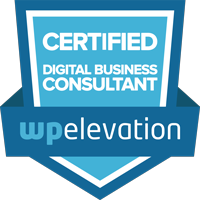WordPress Plugins Are Not a Cure-All
LET'S THINK BEYOND THE PLUGINS.
WordPress plugins are great. They give businesses a way to add functionality and flexibility to their website. But when plugins are not updated consistently many experts warn of virtual attacks and website vulnerability.
Take this common horror story for example:
"My site was hacked and I didn’t have a back-up. I had to scrap the entire thing and rebuild it from the ground up. The attackers exploited a vulnerability in a plugin that I hadn’t updated. If I had only kept my them up to date, I could have saved hours upon hours of my time. I won’t let that happen again.”
Of course keeping your plugins and WordPress core updated IS vitally important. Your site can get hacked if your plugins aren’t regularly updated. Our web care + maintenance plans are one of our most popular services for this very reason. But there is an issue that is missed if you are only focused on keeping your plugins up-to-date. Take a step back and ask “why are you adding so many plugins in the first place?”
PLUGINS ARE NOT A PANACEA
It’s easy to get in the habit of solving your WordPress problems by simply adding plugin, after plugin, after plugin. There are over 44,000 on WordPress.org alone and many more premium plugins available across the Internet. Managing your site by constantly adding plugins can cause some serious issues such as:
- Plugins conflicting with one another rendering one or both obsolete
- Unnecessarily burdening yourself trying to keep all plugins current and up to date
- Bloating your WordPress install and slowing down your site performance
- Increasing the potential for hacking by adding entry points with each plugin installation
WHAT YOU SHOULD DO
Before installing any plugins on your website take a step back and answer these two key questions:
1) What business goal am I trying to achieve?
2) Is this plugin designed to specifically help me achieve this goal?
If question one stops you in your tracks, take a moment and write down what business goals you want your website to support. Make sure your website is working for you and advancing those goals effectively.
Look at each potential plugin critically and make sure that the answer to question 2 is a definitive “yes”. If not, with so many options available, keep looking.
To make sure you are installing a high quality plugin WordPress Beginner advises you to check the following:
- How long since the plugin has been updated?
- Is it compatible with the latest version of WordPress?
- Do you notice people getting answers to their support questions online?
- What type of online rating does it have?
If you can’t find a one that is designed to help you achieve your goals, look for a developer that can add the custom functionality to your site.
Following these simple steps will help keep the number of plugins on your site manageable and by extension, limit the number of potential entry points for hackers. This will also ensure that your plugins support your business rather than hinder it.
Additional Resources
Here are some additional resources to help with WordPress plugins:
How to choose a WordPress plugin:
http://www.wpbeginner.com/beginners-guide/how-to-choose-the-best-wordpress-plugin/
Why WordPress Sites Get Hacked:
https://getflywheel.com/layout/why-do-wordpress-websites-get-hacked/
Best Practices for Keeping Your WordPress Site Up-To-Date:
https://codex.wordpress.org/Updating_WordPress
https://codex.wordpress.org/WordPress_Site_Maintenance



